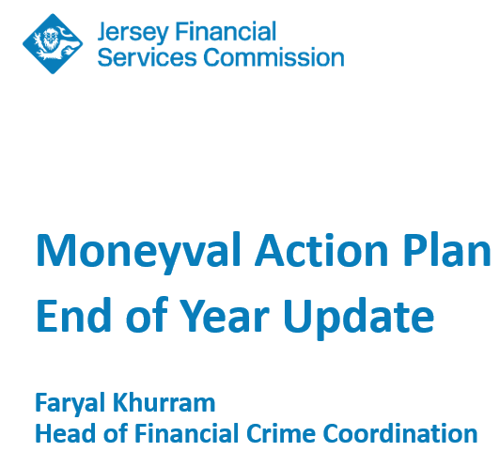
JFSC Moneyval Action Plan: End of Year Update Board Briefing
14/11/2025
Faryal Khurram, THE JFSC Head of Financial Crime Coordination, provided a valuable and comprehensive update on the JFSC’s progress against our MONEYVAL action plan. Jersey Compliance Officers Association

SOURCE - https://tinyurl.com/mts9mzmu


THE FOLLOWING IS A COMSURE RECORD OF THE ABOVE MEETING
Executive Summary
The Jersey Financial Services Commission (JFSC) has made significant progress on the Moneyval Action Plan, addressing 25 recommended actions, including seven priority actions.
Key achievements in 2025 include
- Consultations on criminal background checks and AML Handbook revisions,
- Improved examination approaches,
- Enhancements to the risk model, and
- The implementation of an Obliged Entity Beneficial Ownership (BO) Register in January 2025.
Ongoing efforts focus on refining procedures, guidance, and risk-based supervision.
This update demonstrates JFSC's commitment to enhancing AML/CFT obligations, supervisory mechanisms, and institutional risk assessments, with a planned update at the end of 2025.
Background
- MoneyVal’s evaluation identified 25 recommended actions for Jersey, of which seven were designated as priority actions.
- These actions required further analysis, industry engagements, and high-level deadlines.
- The majority focus on JFSC-specific enhancements to combat money laundering (ML), terrorist financing (TF), and proliferation financing risks.
- Priority areas include improving understanding and implementation of AML/CFT obligations and strengthening supervisory mechanisms.
Key Recommended Actions
Priority Actions: Enhance Understanding & Implementation of AML/CFT Obligations
- Ensure periodic reviews of high-risk customers (especially legacy ones) include documentary evidence for Source of Funds/Source of Wealth (SOF/SOW) and updated beneficial ownership information.
- Assess risks and apply exemptions only where risks are low.
- Provide detailed guidance on complex structures for consistent identification and Enhanced Due Diligence (EDD) measures.
- Improve understanding of control over legal entities beyond ownership through granular guidance and outreach.
- For Politically Exposed Persons (PEPs): Apply all EDD measures to every foreign PEP (including entities with PEP beneficial owners) and treat close associates accordingly.
- Issue sector-specific guidance, prioritising Designated Non-Financial Businesses and Professions (DNFBPs) and Virtual Asset Service Providers (VASPs).
- Enhance Suspicious Activity Report (SAR) reporting: Monitor internal systems, ensure prompt SAR submissions to the Financial Intelligence Unit (FIU).
Priority Actions: Improve Supervisory Mechanisms
- Enhance criminal background checks for Principal Persons (PPs) and Key Persons (KPs) to prevent criminal involvement.
- Review supervisory activities for Legal Persons and Arrangements (LPAs) to detect serious breaches like BO concealment.
- Strengthen Targeted Financial Sanctions (TFS) supervision, including on-sites and improving entities' ability to identify sanctions evasion risks.
- Revise the sanctioning regime to prioritise severe, proportionate penalties for serious breaches.
- Fully implement risk-based supervision for Non-Profit Organisations (NPOs).
Additional Actions: Improve Supervisory Mechanisms
- Enhance the institutional risk assessment model for better ML/TF and TFS risk understanding.
- Increase use of full-scope, focused examinations, and off-site tools for comprehensive AML/CFT coverage.
- Apply greater scrutiny to breaches, distinguishing severe ones.
Recommended Actions: Jersey/Registry
- Extend direct access to the Central Registry for obliged entities and require reporting of discrepancies in BO information.
- Use the full range of sanctions beyond late fees, strike-off notices, and formal breaches.
Progress Update: What We Did in 2025
- Conducted consultations on criminal background checks and AML Handbook revisions.
- Improved examination approaches for better coverage.
- Reviewed and identified enhancements to the JFSC risk model.
- Implemented the Obliged Entity BO Register in January 2025, enabling discrepancy reporting.
- Enhanced internal procedures and provided staff training.
Future Plans: What You Can Expect
- Publish feedback papers on criminal record checks and AML Handbook updates.
- Continue reviewing procedures and guidance for ongoing enhancements.
- Implement enhancements to the risk model.
- Incorporate recommended action themes into examinations.
- Commit to providing an update at the end of 2025.
Risks and Considerations
- High-risk areas like PEPs, complex structures, and sanctions evasion require sustained focus to mitigate ML/TF risks.
- Industry engagement and sector-specific guidance will help ensure consistent implementation.
- Resource allocation for enhanced supervision and risk model refinements is critical.
Next Steps and Recommendations
- Board to note the progress and endorse continued implementation of the action plan.
- Monitor key milestones, including feedback paper publications and risk model enhancements.
- Engage with industry bodies to support the adoption of new guidance and procedures.
End
This briefing is based on the JFSC Moneyval Action Plan End of Year Update presentation (November 2025). All information is JFSC Sensitive.
For further details or questions, contact: Faryal Khurram, Head of Financial Crime Coordination, f.khurram@jerseyfsc.org

The Team
Meet the team of industry experts behind Comsure
Find out moreLatest News
Keep up to date with the very latest news from Comsure
Find out moreGallery
View our latest imagery from our news and work
Find out moreContact
Think we can help you and your business? Chat to us today
Get In TouchNews Disclaimer
As well as owning and publishing Comsure's copyrighted works, Comsure wishes to use the copyright-protected works of others. To do so, Comsure is applying for exemptions in the UK copyright law. There are certain very specific situations where Comsure is permitted to do so without seeking permission from the owner. These exemptions are in the copyright sections of the Copyright, Designs and Patents Act 1988 (as amended)[www.gov.UK/government/publications/copyright-acts-and-related-laws]. Many situations allow for Comsure to apply for exemptions. These include 1] Non-commercial research and private study, 2] Criticism, review and reporting of current events, 3] the copying of works in any medium as long as the use is to illustrate a point. 4] no posting is for commercial purposes [payment]. (for a full list of exemptions, please read here www.gov.uk/guidance/exceptions-to-copyright]. Concerning the exceptions, Comsure will acknowledge the work of the source author by providing a link to the source material. Comsure claims no ownership of non-Comsure content. The non-Comsure articles posted on the Comsure website are deemed important, relevant, and newsworthy to a Comsure audience (e.g. regulated financial services and professional firms [DNFSBs]). Comsure does not wish to take any credit for the publication, and the publication can be read in full in its original form if you click the articles link that always accompanies the news item. Also, Comsure does not seek any payment for highlighting these important articles. If you want any article removed, Comsure will automatically do so on a reasonable request if you email info@comsuregroup.com.


